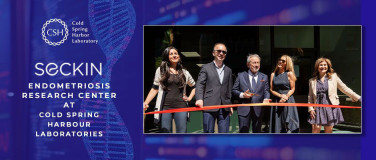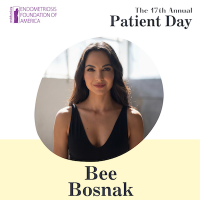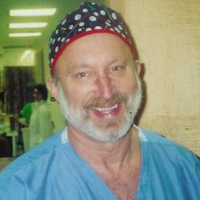EndoFound supports a wide range of innovative research studies that aim to develop better strategies in diagnosing and treating endometriosis. These studies encompass a wide range of topics, from the social impact of the disease to the molecular level. Discover more about the researchers we have funded through our Researcher Spotlight interviews below!
Researcher Spotlight with Dr. Chandrakant Tayade
Dr. Chandrakant Tayade is a Professor in the Department of Biomedical and Molecular Sciences at Queen's University, whose work focuses on immunology. In 2019, he received a grant from EndoFound to study the role of the immune system in endometriosis. Dr. Tayade is collaborating with researchers from Northwell Health on the Research Outsmarts Endometriosis (ROSE) study to analyze biobanked menstrual effluent samples from endometriosis patients. His team has specifically been investigating an immune cell called T helper 17 cells, involved in functions such as managing inflammation, tissue integrity, and fighting infections, as well as cytokines, which may be critical to the pathogenesis of endometriosis. Preliminary findings have shown that endometriosis patients have a lower number of T helper 17 cells and elevated cytokines compared to women without endometriosis. In the next stages, Dr. Tayade and his team plan to analyze blood samples from the same patients to see how results from local menstrual effluent will compare to the systemic level.
Researcher Spotlight with Dr. Anna Pollack
Dr. Anna Pollack is an Associate Professor at George Mason University College of Health and Human Services in the Department of Community and Global Health. She received an EndoFound grant in 2018 to study endocrine-disrupting chemicals in individuals with endometriosis. Dr. Pollack explained how our bodies are exposed to these chemicals all over the life course, which may affect the natural functioning of hormones. Studying these chemicals can help give new insight into which chemicals may increase the risk of endometriosis, can inform new policies to reduce exposure, and ultimately help decrease the risk they pose to the development of endometriosis. Dr. Pollack also discussed how this grant was critical in providing the preliminary data to apply for a larger grant from the National Institutes of Health. "We’re leveraging stored tissue samples from the eutopic endometrium as well as from ectopic endometrium tissue samples which will be measured for a range of chemical exposures. This will really provide us with a way, uniquely for the first time, to evaluate the dose of these chemicals at the target tissue,” Dr. Pollack says.
Researcher Spotlight with Dr. Khash Khazaie and Dr. Zaraq Khan
Khash Khazaie PhD, DSc is Professor of Immunology and expert in inflammation, and Zaraq Khan, MD is Assistant Professor of Obstetrics & Gynecology, and Chair of the Divisions of Reproductive Endocrinology & Infertility with joint appointment as a consultant surgeon in the Division of Minimally Invasive Gynecologic Surgery, at the Mayo Clinic. EndoFound spoke to Dr. Khazaie and Dr. Khan about their project rewarded a 2019 EndoFound grant, which explores the genetic basis of scar tissue formation in endometriosis. Through their research in mice, they've discovered that scarring is likely to result from a combination of inherent mutations in endometriosis lesions and the type of immune responses created against those mutations. Molecular analysis has so far focused on a specific gene mutation in the TGFß pathway involved in inflammation control. The researchers plan on taking their project to the next level by exploring this topic in patients with endometriosis. Dr. Khazaie and Dr. Khan hope that this work will help us better understand how the immune response interplays with endometriosis, and that it leads to the development of a therapeutic target.
Researcher Spotlight with Dr. Hugh Taylor and Dr. Valerie Flores
EndoFound had the pleasure of interviewing Dr. Hugh Taylor, Anita O'Keeffe Young Professor and Chair, Department of Obstetrics Gynecology and Reproductive Sciences at Yale School of Medicine and Chief of Obstetrics and Gynecology at Yale-New Haven Hospital, and Dr. Valerie Flores, Assistant Professor of Obstetrics, Gynecology and Reproductive Sciences at the Yale School of Medicine, and a Reproductive Scientist Development Program (RSDP) Scholar. The researchers discussed their research grant, received from EndoFound in 2019. In an effort to understand why some individuals with endometriosis respond to progesterone based therapies, while others do not, Dr. Taylor and Dr. Flores investigated the expression of progesterone receptors in women with endometriosis. The translational impact of this work is that by applying progesterone receptor testing, medical professionals are able to understand which patients will respond to progesterone therapy, thereby ensuring treatment will be effective from the outset. Dr. Taylor and Dr. Flores are now taking these findings further by exploring why progesterone receptor expression varies in patients and hypothesize that inflammation may play a key role. They express how EndoFound's funding has been critical in supporting them in this research pursuit.
Researcher Spotlight with Dr. Erin Greaves
EndoFound sat down with Dr. Erin Greaves, Assistant Professor at Warwick Medical School in the UK, to talk about the research grant she received from EndoFound in 2018. Dr. Greaves discussed how her team has been investigating mouse models of endometriosis to find a model that is most representative of the pathology of endometriosis in women. She explained that this is critical for research on endometriosis, as researchers need the "most physiologically relevant pre-clinical platforms" to test new therapies and find new therapeutic targets. Dr. Greaves also talked about other projects she is working on related to macrophages, a type of immune cell that is involved in the pathophysiology of endometriosis which contributes to pain. This work is trying to determine the source of these macrophages and the specific types that promote disease.
Researcher Spotlight with Dr. Rama Kommagani
Dr. Rama Kommagani, Assistant Professor in the Department of Obstetrics & Gynecology at Washington University School of Medicine St. Louis, joined EndoFound for this Researcher Spotlight with Deniz Kocas, EndoFound Research Advisor. Dr. Kommagani discusses how his research on genetic mutations in endometriosis, funded by EndoFound in 2018, can shed light on the development of new diagnostic tools and treatment for endometriosis. Furthermore, his other projects on the gut microbiome have demonstrated that just like environmental and genetic factors, specific bacteria from the diet we consume can impact endometriosis disease progression. Throughout the interview, Dr. Kommagani emphasizes the heterogeneous nature of endometriosis and that future research needs to address the diversity of the condition. He closes by noting that more collaboration and funding is necessary to advance endometriosis research.
Researcher Spotlight with Dr. Katie Burns
Dr. Katherine (Katie) Burns is an Assistant Professor at the University of Cincinnati College of Medicine in the Department of Environmental Health, who received an EndoFound grant in 2018 for her project titled "Exploring the effect of DEHP on endometriosis and and the immune system in a mouse model of endometriosis." EndoFound Research Advisor Deniz Kocas recently sat down with Dr. Katie Burns, an endometriosis patient herself, to discuss how her participation in a National Institute of Health (NIH) clinical trial inspired her to conduct research on endometriosis. Dr. Burns’ research focuses on environmental chemicals that may contribute to developing endometriosis, non-hormonal treatments for endometriosis, and immune cells that may initiate endometriosis. She also discusses why her relationship with EndoFound has been critical to her research, as well as the challenges endometriosis researchers face. Dr. Burns closes by offering suggestions for future endometriosis research.
Researcher Spotlight with Dr. Ie-Ming Shih
EndoFound Research Advisor, Deniz Kocas, recently sat down with Ie-Ming Shih, MD, PhD, who is the Richard TeLinde Distinguished Professor of Gynecologic Pathology at the Johns Hopkins University School of Medicine. In this interview, Dr. Shih discusses how he recognized the need for high impact research in endometriosis and applied his training in gynecologic pathology and cancer molecular genetics to conduct endometriosis research. His project, funded by EndoFound in 2018, revealed that deep-infiltrating endometriosis (DIE) harbors somatic cancer-associated mutations and was published in the New England Journal of Medicine. With excitement, Dr. Shih discusses how these preliminary results motivated him and his team to collaborate with other researchers and apply for an NIH grant. This has resulted in an award of over $3 million which Dr. Shih hopes will result in better diagnosis and treatment for women with endometriosis. Dr. Shih expresses his sincere gratitude to EndoFound for providing the seed funding for the initial project that made it possible to apply to the NIH.
Researcher Spotlight with Dr. Serdar Bulun
Dr. Serdar Bulun, John J. Sciarra Professor of Obstetrics and Gynecology and Chair of the Department of Obstetrics and Gynecology at Northwestern Medicine, joined EndoFound for a Researcher Spotlight. Dr. Bulun explained how stromal cells in the endometrium of endometriosis patients are epigenetically defective which has led his team to focus on these cells as a potential therapeutic target. His work investigates whether these cells can be replaced by using induced pluripotent stem cells. Dr. Bulun shared how he has observed the detrimental impact endometriosis has on his patients' lives, and that the main motivating factor for conducting this research is to discover new treatments to improve patients' quality of life. He closes by explaining that an ideal model to study endometriosis is still lacking and shares his insight into the research he believes should be conducted on endometriosis going forward.









